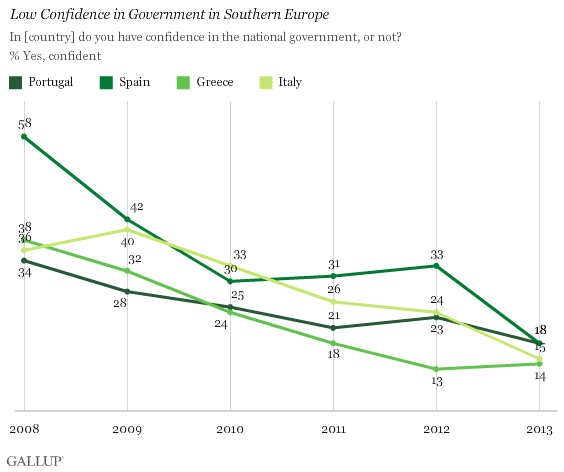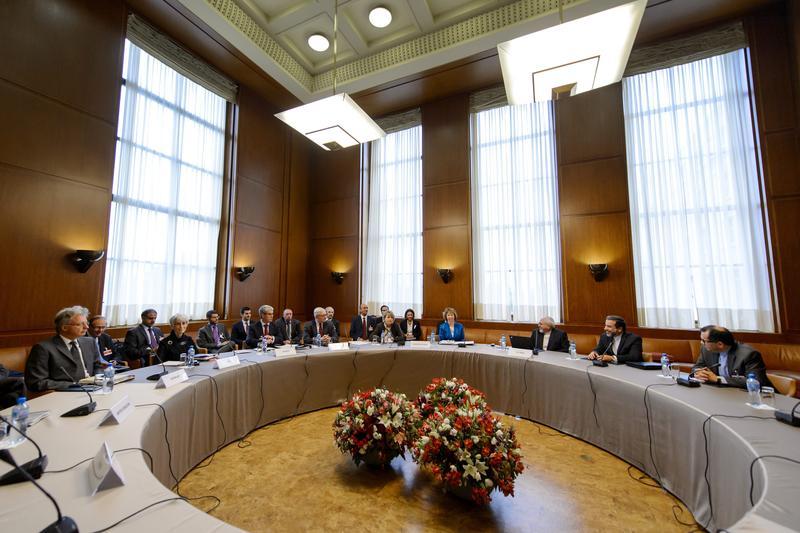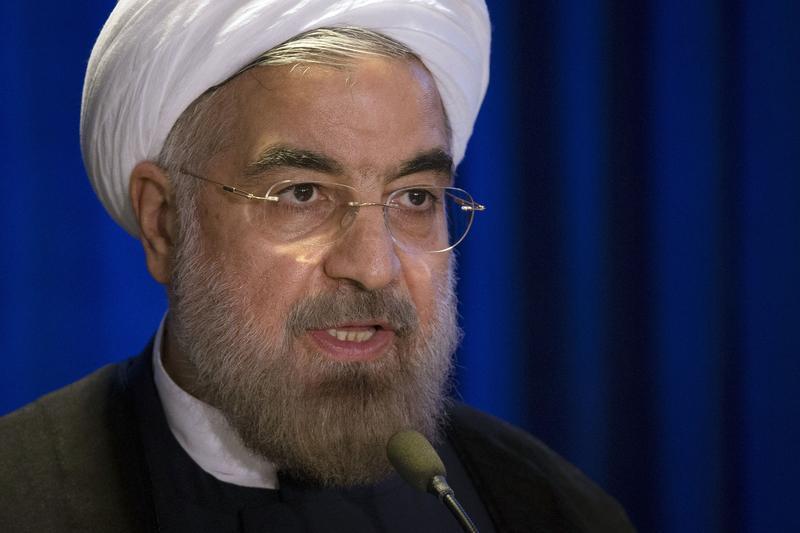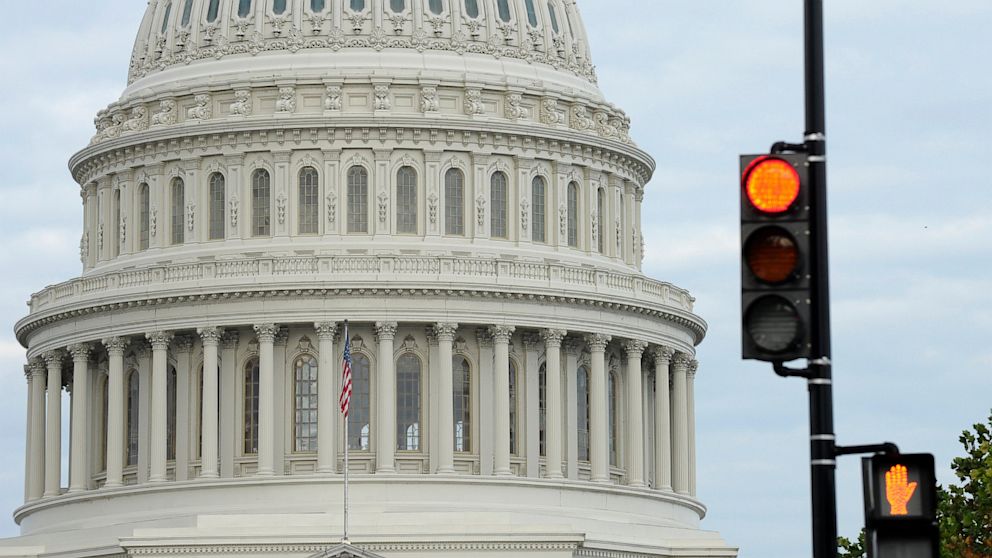Southern Europeans Don't Trust Their Governments
Less than one-in-five residents of Portugal, Spain, Greece and Italy say they have confidence in their governments, according to a new poll from Gallup.
Not surprisingly, confidence has been on an almost unbroken downward spiral since the global financial crisis put the screws to the Eurozone economy.

Further, fewer than one-in-four people in Southern Europe approve of their political leadership with Greece registering a lowly 14 percent approval followed by Portugal and Spain tied at 20 percent. Italy's leadership did the best... at 24 percent approval.
I Spy with My Little Eye

"Guten Tag. It's the NSA."
In 2010, a Russian spy ring was caught in the United States. It made big news, mostly because one of the spies, Anna Chapman, looked like this -- confirming in the minds of hopeful young males all over the world that James Bond films are not mere fiction, but depictions of reality. The American media had a good laugh over the situation, amused by Russia's quaint Cold War mentality.
The Obama administration, correctly, didn't make much of a fuss over it. Ms. Chapman and her cohorts were quickly deported back to Russia. Why did the administration take this approach? Because we've got American spies in Russia, too. Actually, the U.S. has spies everywhere, and we use technology to spy on everybody, including our friends. And our friends spy on us, too.
Don't take just our word for it. Here's what former head of French intelligence Bernard Squarcini had to say:
“The French intelligence services know full well that all countries, whether or not they are allies in the fight against terrorism, spy on each other all the time,” he said.“The Americans spy on French commercial and industrial interests, and we do the same to them because it’s in the national interest to protect our companies.”
That's why the latest kerfluffle over how America (allegedly) tapped German Chancellor Angela Merkel's cell phone is a bit curious. If the French openly confess to spying on America, then Germany is spying on us, too -- whether or not they're willing to admit it. So why the hypocrisy? Why are Germans so critical of America when their intelligence agency is doing the same thing?
In Germany's case, the answer may have to do with their recent past. The Germans have nasty memories of the "Stasi," the secret police of former East Germany, who extensively spied on its own citizens.
But Germans aren't the only ones who are angry. Other Europeans, including the French, expressed outrage. Why? The answer appears to be one of scale: America's surveillance program is larger and better than everybody else's.
The BBC reports:
"Every country has weapons for spying, but most have the equivalent of a howitzer," says James Bamford, who has written extensively on the National Security Agency. "In terms of eavesdropping, the US has a nuclear weapon."
Perhaps tapping Ms. Merkel's phone -- if the U.S. actually did that -- was a step too far in Europeans' eyes. Maybe they are correct. Americans would probably be upset if they knew President Obama's cell phone was being tapped by German intelligence.
At the same time, however, Europe's complaints ring hollow. If they admit to spying, then the disagreement isn't over diplomatic protocol, but technological ability. Europeans are simply upset that the U.S. is far better at spying than they are. That's like complaining about "bullying" after your high school football team gets beat 91-0.
The only countries that agreed not to spy on each other are part of the "Five Eyes" alliance -- U.S., UK, Canada, Australia and New Zealand.
But, we're probably spying on each other, anyway.
(Photo: Reuters via Der Spiegel)
Iranian Terrorism

Matthew Levitt recounts Iran's history of terror sponsorship:
Thirty years ago today, on Oct. 23, 1983, a delivery van filled with 18,000 pounds of explosives slammed into the U.S. Marine barracks in Beirut. Seconds later, another car bomb hit a French military building four miles away. A total of 241 American and 58 French soldiers lost their lives, all members of the Multi-National Forces in Lebanon.
The attack on the Marine barracks was not only the single-largest nonnuclear explosion since World War II, it was also the deadliest terrorist attack against Americans up to that time. [Emphasis mine.]
Was the Marine barracks attack, heinous as it unquestionably was, really "terrorism"? By definition, the barracks housed military service members, not civilians.
If attacks on military targets stationed overseas in a war zone constitute terrorism, then the word essentially has no meaning. Worse, America would then be guilty of terrorism on a scale that is orders of magnitude more severe than anything Iran has done, given the number of military targets the U.S. has blown up since 1983.
(AP Photo)
Germany's Coalition Talks: Checking in on Angela Merkel

Angela Merkel's monumental victory on election night wasn't quite big enough to allow her Christian Democratic Union (CDU) party to govern on its own. The party won 311 seats, just five seats shy of an outright majority. As a result, Ms. Merkel must negotiate with other parties to form a coalition government.
In 2005, the last time Merkel's CDU was forced into an ideologically awkward "grand coalition" with the center-left Social Democratic Party (SPD), a government was formed after six weeks of negotiations. This time, the CDU has already conducted two rounds of talks with the SPD, followed by failed talks with the center-left Green Party. Now, the SPD is back for Round 3.
But they come bearing a list of demands.
According to Reuters, included in the SPD's list of ten "non-negotiable" demands is "a minimum wage of 8.50 euros per hour, equal pay for men and women, greater investment in infrastructure and education, and a common strategy to boost euro zone growth and employment." They also want "equal pensions for seniors in the former West and East Germany, the ability to have dual citizenship, and measures to make it easier to combine work with family life."
Of all these demands, implementing a national minimum wage will be the trickiest. Merkel is in favor of something resembling the current system, in which sector-specific minimum wages are negotiated between employers and unions. Additionally, German economists are opposed, warning that a national minimum wage of €8.50 will cost jobs, particularly in former East Germany.
The SPD claims that it is not afraid of calling for new elections if they are unable to form a government with the CDU.
However, given Ms. Merkel's personal popularity and the German people's desire to see a CDU-SPD grand coalition, that may not be a very smart gamble. One could easily see Merkel winning an outright majority if Germans were forced to vote again.
(AP Photo)
Marco Rubio Wants to Make Iran an "Offer" They'll Happily Refuse
What Marco Rubio doesn't get about negotiations with Iran.

Senator Marco Rubio has some ideas about how to "negotiate" with Iran:
And so the bottom line in any negotiations should be clear: the only way sanctions on Iran will be lifted or suspended is if they agree to completely abandon any capability for enrichment or reprocessing. Iran has a right to a peaceful civilian nuclear energy program, but it does not have the right to enrich or reprocess.Holding this line is especially important in light of Iran's repeated and blatant disregard of its international obligations. Even a limited enrichment program and possession of sensitive reprocessing technologies is unacceptable because it would keep the path to nuclear weapons open. In fact, until Iran agrees to abandon enrichment and reprocessing, Congress should move to implement a new round of additional sanctions without delay.
As Daniel Larison notes, the Iranians have repeatedly insisted that forsaking domestic enrichment is a non-starter. So what Rubio is actually insisting on is not a negotiated settlement, but Iranian capitulation. How likely is it that Iran will knuckle under to Rubio's demands?
According to Gallup, a majority of Iranians (56 percent) approve of a nuclear program for non-military use while only 34 percent support a militarized nuclear program (41 percent oppose). Gallup did not wade into the specifics of whether Iranians would be willing to forgo domestic enrichment for a non-military nuclear program, so it's possible there is some wiggle room on this question. Still, some form of indigenous nuclear program is popular in Iran even after the costs of that program to Iranian standards of living has risen.
There's another questionable assertion in Rubio's op-ed:
The main reason why Iran's leaders are making noises about negotiating with the world now is because, over the last few years, the United States and the European Union have imposed significant sanctions on Iran. Those sanctions are starting to hurt the regime.It has made it more difficult for them to export terrorism around the world. [Emphasis added.]
It's unquestionably true that sanctions have put the hurt on Iran, but it is absolutely not true that sanctions have thwarted Iran's ability to "export terrorism." In fact, we have rather clear evidence from the Washington Institute's Matthew Levitt that sanctions and the covert campaign of sabotage and assassination that the U.S. and Israel have unleashed on Iran have fueled the Islamic Republic's recent acts of international terrorism.
From the attempt on the Saudi ambassador's life in the U.S. to attacks in Bulgaria and thwarted attacks elsewhere, there is a fairly strong correlation between the increase in "pressure" on Iran and the increase in Iranian retaliation around the world.
(AP Photo)
Our Words Are Backed with Nuclear Weapons
Fans of the incredibly popular series of computer games called Civilization will recall the strange acts of diplomacy in the early iterations of the game. For instance, whenever a rival civilization joined the nuclear club, it would always mention that fact at the beginning of any negotiation. This would result in rather awkward situations, such as Gandhi casually mentioning that he's packing some serious heat.

Diplomacy in subsequent editions became more sophisticated and realistic, but even this primitive form of diplomacy carries a hint of truth about modern international relations: countries seek nuclear weapons not necessarily because they plan to use them, but because they believe it gives them leverage.
That's why all the worry over Iran's nuclear program, mostly from neoconservatives, is largely misplaced. The consensus in the foreign policy community is that Iran is an aggressive, rational actor. Unlike al-Qaeda or other terrorists, they aren't suicidal. The Persians want power and influence, particularly in the Middle East, and nuclear weapons are a means to achieve that end. As Barry Rubin writes for the Jerusalem Post:
[Iran's] basic goal was and is to be as powerful a regional hegemon as possible - including control over Syria and Lebanon. It would like to take leadership of all Muslims in the area...Nuclear weapons are thus for Iran primarily a defensive shield enabling it to carry out conventional aggression with impunity.
This is also why "Rouhanimania," overly optimistic enthusiasm about Iran's new president, is also misplaced. Like former President Mahmoud Ahmadinejad, Mr. Rouhani also wants Iran to be a powerful country, and he very likely believes that nuclear weapons are an appropriate avenue to achieve that end. Therefore, the only real difference between Mr. Rouhani and Mr. Ahmadinejad is that the former has a thicker beard and friendlier rhetoric. Iran's regional ambitions, however, haven't changed much.
Besides, even if Mr. Rouhani sincerely doesn't want nuclear weapons, Supreme Leader Ali Khamenei (despite his alleged fatwa) probably does. And, as we learned recently, Mr. Rouhani appears not to even have the authority to shake President Obama's hand.
One is left to wonder how much power, if any, Mr. Rouhani actually possesses.
Regardless of the answer to that question, one thing is definitely clear: Mr. Rouhani will be taken far more seriously if his words are backed with nuclear weapons.
(Image: TVTropes.org)
The Truth About Any Nuclear Deal with Iran
This is the only deal Iran will accept. But will Israel take it?

Stephen Walt gets to the heart of it:
...[A]ny deal that Tehran will accept is still going to leave it with the ability to produce a bomb if it ever decides it needs to; we are mostly going to be negotiating over the length of time it would take them to do so and thus how much warning we are likely to get.
It's not clear yet whether the U.S. is willing to live with such a deal. Obama's national security adviser Susan Rice said late last month that any Iran deal would not include domestic uranium enrichment (though Iran would be allowed to import enriched uranium for electrical generation). Still, it's conceivable that if a deal were in sight, the Obama administration and its European partners would relent and agree to Iranian enrichment under international inspections. (Lithuania's foreign minister has said as much.)
What's less clear is how Israel would respond to any deal that allows Iran to retain domestic uranium enrichment. Prime Minister Netanyahu's government has repeatedly insisted that Iran can have no such capability but would Netanyahu be willing to rupture a U.S. deal with a military strike? It's one thing to complain publicly about an American policy, quite another to literally blow it up.
(AP Photo)
U.S. Government Shutdown Puzzles the World

Bewildered and concerned. That's the general reaction to the shutdown of the world's most powerful government. In a spot-on editorial last week, USA Today wrote:
When Congress proves incapable of even its most basic functions — keeping the government running and paying its bills — it undermines the American brand abroad, and with it the nation's ability to be the shining beacon to which others look.
Correct. Indeed, publications all over the world are expressing similar sentiments.
The British weekly magazine, The Economist, wrote:
AS MIDNIGHT on September 30th approached, everybody on Capitol Hill blamed everybody else for the imminent shutdown of America’s government. To a wondering world, the recriminations missed the point. When you are brawling on the edge of a cliff, the big question is not “Who is right?”, but “What the hell are you doing on the edge of a cliff?”
Similarly, the German publication Der Spiegel opined:
Many Germans have found it hard to understand American lawmakers' inability to resolve their budget disagreements in time to prevent a shutdown of all nonessential government services, which went into effect at midnight on Monday night. "What Washington currently offers up is a spectacle, but one in which the spectators feel more like crying," writes the conservative daily Frankfurter Allgemeine Zeitung.
Our friendly neighbors to the north echoed some of the more practical concerns that many people all over the world are having. According to Maclean's:
Every single time the American economy faces some kind of crisis, people in Canada get nervous. Any risk south of the border threatens our own economic good fortune.
Most interesting -- and unexpected -- is China's reaction. Although Chinese media is expressing concern over America's ability to repay its debts, the tone has not been one of mockery, as we might expect. Instead, as Foreign Policy explains:
Americans would be forgiven for assuming that observers in China, whose government is not averse to showcasing U.S. government failures to burnish the ruling Communist Party's image, are watching all this and indulging in schadenfreude. Instead, both China's state-run and private-but-state-supervised mainstream media outlets have thus far reacted with restraint.
The article goes on to detail the reactions of various Chinese citizens. Many of them do not think a government shutdown reflects poorly on democracy. Some even believe that the fact mass chaos didn't follow the government shutdown speaks to the strength of the United States as a nation.
One thing is clear: Any Americans planning to do some international travel in the near future should be prepared to answer some questions.
(AP Photo)

